Gladys Cooper | |
|---|---|
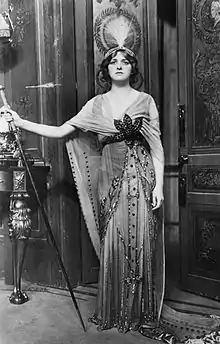 Cooper in 1913 | |
| Born | Gladys Constance Cooper 18 December 1888 Hither Green, London, England |
| Died | 17 November 1971 (aged 82) Henley-on-Thames, Oxfordshire, England |
| Occupation | Actress |
| Years active | 1905–1971 |
| Spouses | Capt. Herbert John Buckmaster
(m. 1908; div. 1921) |
| Children | 3 |
Dame Gladys Constance Cooper, DBE (18 December 1888 – 17 November 1971) was an English actress, theatrical manager and producer, whose career spanned seven decades on stage, in films and on television.
Beginning as a teenager in Edwardian musical comedy and pantomime, she starred in dramatic roles and silent films before the First World War. She managed the Playhouse Theatre from 1917 to 1934, where she starred in many roles. From the early 1920s Cooper won praise in plays by W. Somerset Maugham and others.
In the 1930s she starred steadily in productions both in London's West End and on Broadway. Moving to Hollywood in 1940, Cooper found success in a variety of character roles. She received three Academy Award nominations for Best Supporting Actress, for performances in The Song of Bernadette (1943), My Fair Lady (1964) and, most famously, Now, Voyager (1942). Throughout the 1950s and 60s she worked both on stage and on screen, continuing to star on stage until her last year.
Early life and career
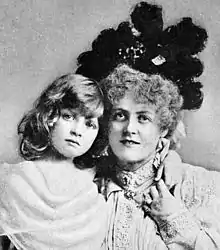
Marie Studholme, c. 1894
Cooper was born at 23 Ennersdale Road, Hither Green, Lewisham, London, the eldest of the three daughters of Charles William Frederick Cooper (1844–1939) by his marriage to Mabel Barnett (1861–1944). Her two younger sisters were Doris Mabel (1891–1987) and Grace Muriel (1893–1982). Writer Henry St. John Cooper was a half-brother.[1] Cooper spent most of her childhood in Chiswick, where her family moved when she was an infant.
She made her stage debut in 1905 touring with Seymour Hicks in his musical Bluebell in Fairyland and was becoming a popular photographic model. In 1906, she appeared as Lady Swan in London in The Belle of Mayfair and then in the pantomime Babes in the Wood as Mavis. The following year she became a chorus girl at the Gaiety Theatre, creating the small role of Eva in The Girls of Gottenberg. That Christmas, she was again in Babes in the Wood, this time playing Molly. In 1908, she appeared in the musical Havana followed, the next year, by Our Miss Gibbs, in which she played Lady Connie; she was then on tour again with Hicks, in Papa's Wife, before playing Sadie von Tromp in the operetta The Dollar Princess at Daly's Theatre in 1909. In 1911, she appeared in a production of The Importance of Being Earnest and in Man and Superman. Among several other plays, the next year she was Muriel Pym in Milestones at the Royalty Theatre. A highlight of 1913 was Dora in Diplomacy at Wyndham's Theatre. That year she also played the title role in The Pursuit of Pamela at the Royalty.[2]
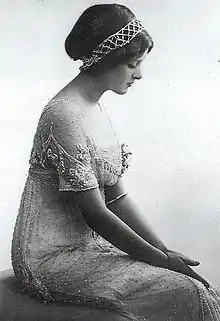
In 1913 Cooper appeared in her first film, The Eleventh Commandment, going on to make several more silent films during the First World War and shortly afterwards. She continued full-time stage work, however, including appearances as Lady Agatha Lazenby in The Admirable Crichton in 1916 and Clara de Foenix in Trelawny of the Wells. In addition, in 1917, Cooper became co-manager, with Frank Curzon, of the Playhouse Theatre, taking over sole control from 1927 until she left in 1933. During these years, she starred several times in My Lady's Dress. She appeared in W. Somerset Maugham's Home and Beauty in 1919, repeated Dora at His Majesty's Theatre in 1920 and elsewhere thereafter, and both produced and played numerous roles at the Playhouse Theatre.[2][3]
It was not until 1922, however, now in her mid-thirties, that she found major critical success, in Arthur Wing Pinero's The Second Mrs. Tanqueray. Early in her stage career, she was criticised for being too stiff. Aldous Huxley dismissed her performance in Home and Beauty, writing "she is too impassive, too statuesque, playing all the time as if she were Galatea, newly unpetrified and still unused to the ways of the living world."[4] Evidently, her acting improved during this period, as Maugham praised her for "turning herself from an indifferent actress to an extremely competent one" through her common sense and industriousness.[5] For both the 1923 and 1924 Christmas shows at the Adelphi Theatre, Cooper played the title character in Peter Pan, while also playing several other roles at that theatre during those two years. She appeared in Maugham's The Letter in London and on tour in 1927 and 1928, in Excelsior (adapted from "L'Ecole des Cocottes" by H.M. Harwood) in 1928, and in Maugham's The Sacred Flame in 1929, also in London and on tour.[6]
Among other roles, Cooper was Clemency Warlock in Cynara (1930), Wanda Heriot in The Pelican (1931), Lucy Haydon in Dr Pygmalion (1932), Carola in The Firebird (1932), Jane Claydon in The Rats of Norway (1933), Mariella Linden in The Shining Hour in 1934 and 1935, in London and New York City and on tour (at the same time making her first "talkie" film, The Iron Duke), also playing Desdemona and Lady Macbeth on Broadway in 1935. She was Dorothy Hilton in Call it a Day, again in both London and New York, from 1935 to 1936. A highlight of 1937 was Laura Lorimer in Goodbye to Yesterday in London and on tour. In 1938, she played Tiny Fox-Collier in Spring Meeting in New York, Montreal and Britain, as well as several Shakespeare roles and Fran Dodsworth in Dodsworth. She repeated Spring Meeting in 1939.[2]
Later career
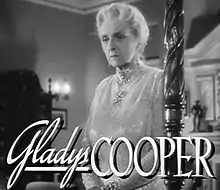
Cooper turned to film full-time in 1940, finding success in Hollywood in a variety of character roles and was frequently cast as a disapproving, aristocratic society woman, although she sometimes played lively, approachable types, as she did in Rebecca (1940). She was nominated three times for an Academy Award for Best Supporting Actress for her performances as Bette Davis's domineering mother in Now, Voyager (1942), a sceptical nun in The Song of Bernadette (1943), and Rex Harrison's mother, Mrs. Higgins, in My Fair Lady (1964). In 1945, after playing the role of Clarissa Scott in the film The Valley of Decision, for Metro-Goldwyn-Mayer she was given a contract with the studio.[7] Her credits there included both dramatic and comedy films, including The Green Years (1946), The Cockeyed Miracle (1946) and The Secret Garden (1949). Other notable film roles were The Man Who Loved Redheads (1955), Separate Tables (1958) and The Happiest Millionaire (1967) as Aunt Mary Drexel, singing "There Are Those".[8]
Her only stage roles in the 1940s were Mrs. Parrilow in The Morning Star in Philadelphia and New York (1942) and Melanie Aspen in The Indifferent Shepherd in Britain (1948). She returned to theatre (between films) more often in the 1950s and 1960s, playing in London and on tour in such roles as Edith Fenton in The Hat Trick (1950); Felicity, Countess of Marshwood, in Relative Values (1951 and 1953); Grace Smith in A Question of Fact (1953); Lady Yarmouth in The Night of the Ball (1954); Mrs. St. Maugham in The Chalk Garden (1955–56), Dame Mildred in The Bright One (1958); Mrs. Vincent in Look on Tempests (1960); Mrs. Gantry (Bobby) in The Bird of Time (1961); Mrs. Moore in a stage adaptation of A Passage to India (1962); Mrs Tabret in The Sacred Flame (1966 and 1967); Prue Salter in Let's All Go Down the Strand (1967); Emma Littlewood in Out of the Question (1968); Lydia in His, Hers and Theirs (1969); and others. She received two nominations for the Tony Award for Best Actress in a Play, for her roles in The Chalk Garden and A Passage to India.[9]
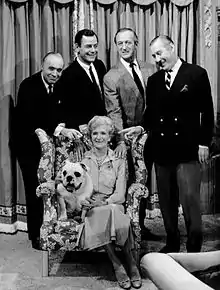
She also had various television roles in the 1950s and '60s.[2] These included, among others, three episodes of The Twilight Zone: "Nothing in the Dark" (1962), "Passage on the Lady Anne" (1963) and "Night Call" (1964).[10] Cooper starred in the 1964–65 series The Rogues with David Niven, Charles Boyer, Gig Young, Robert Coote, John Williams and Larry Hagman. The series lasted a single season of thirty episodes, most of which featured Cooper as the matriarch of an ethical family of con artists who only prey on criminals.[11]
In 1967, at the age of 79, she was appointed a Dame Commander of the Order of the British Empire (DBE).[12] Her last major success on the stage was at age 82, in 1970–71 in the role of Mrs. St. Maugham in Enid Bagnold's The Chalk Garden, a role she had created on Broadway and in the West End in 1955–56.[2]
Her final public appearance was on the 5 May 1971 episode of The Dick Cavett Show, on which she guested with son-in-law Robert Morley in London. On the day following Cooper's death, her Now, Voyager co-star Bette Davis appeared on The Dick Cavett Show and called Cooper "Without a doubt, the most beautiful person as well as actress, and a professional ... never was she late one minute, never didn't she know every line."[13]
Private life and final years
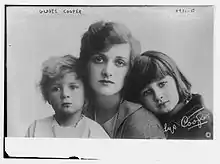
Cooper was married three times.
- Captain Herbert Buckmaster (1908–1921).[14] The couple had two children: Joan (1910–2005), who married the actor Robert Morley,[15] and John Rodney (1915–1983).[16]
- Sir Neville Pearson (1927–1936).[17] Sir Neville and Lady Pearson had one daughter, Sally Pearson, aka Sally Cooper, who was married to the actor Robert Hardy from 1961 to 1986.[18]
- Philip Merivale (1937–1946), a fellow actor. The couple lived for many years in Santa Monica, California as permanent resident aliens. He died at age 59 from a heart ailment. Her stepson from this marriage was John Merivale.[19]
Cooper published a self-titled autobiography in 1931.[20] She lived mostly in England in her final years and died from pneumonia in 1971 at the age of 82 in Henley-on-Thames, Oxfordshire.[19]
Filmography
| Year | Title | Role | Note |
|---|---|---|---|
| 1913 | The Eleventh Commandment | Edith | Short |
| 1914 | Danny Donovan, the Gentleman Cracksman | Mrs. Ashworth | Short |
| 1916 | The Real Thing at Last | American Witch | Short |
| 1917 | The Sorrows of Satan | Lady Sybil Elton | |
| Masks and Faces | Mabel Vane | ||
| My Lady's Dress | The Wife | ||
| 1920 | Unmarried | ||
| 1921 | Headin' North | Madge Mullin | |
| 1922 | The Bohemian Girl | Arlene Arnheim | |
| 1923 | Bonnie Prince Charlie | Flora MacDonald | Lost film |
| 1934 | The Iron Duke | Duchess d'Angoulême | |
| 1940 | Rebecca | Beatrice Lacy | Maxim's sister |
| Kitty Foyle | Mrs. Strafford | ||
| 1941 | That Hamilton Woman | Frances, Lady Nelson | |
| The Black Cat | Myrna Hartley | ||
| A Yank in the R.A.F. | Mrs. Pillby | (scenes deleted) | |
| The Gay Falcon | Maxine Wood | ||
| 1942 | This Above All | Iris Cathaway | |
| Eagle Squadron | Aunt Emmeline | ||
| Now, Voyager | Mrs. Henry Vale | Nominated: Academy Award for Best Supporting Actress | |
| 1943 | Forever and a Day | Mrs. Barringer | |
| Mr. Lucky | Captain Veronica Steadman | ||
| Princess O'Rourke | Miss Haskell | ||
| The Song of Bernadette | Sister Marie Therese Vauzou | Nominated: Academy Award for Best Supporting Actress | |
| 1944 | The White Cliffs of Dover | Lady Jean Ashwood | |
| Mrs. Parkington | Alice, Duchess de Brancourt | ||
| 1945 | The Valley of Decision | Clarissa Scott | |
| Love Letters | Beatrice Remington | ||
| 1946 | The Green Years | Grandma Leckie | |
| Beware of Pity | Mrs. Klara Condor | ||
| The Cockeyed Miracle | Amy Griggs | ||
| 1947 | Green Dolphin Street | Sophie Patourel | |
| The Bishop's Wife | Mrs. Hamilton | ||
| 1948 | Homecoming | Mrs. Kirby | |
| The Pirate | Aunt Inez | ||
| 1949 | The Secret Garden | Mrs. Medlock | |
| Madame Bovary | Mme. Dupuis | ||
| 1951 | Thunder on the Hill | Mother Superior | |
| 1952 | At Sword's Point | Queen Anne | |
| 1955 | The Man Who Loved Redheads | Caroline, Lady Binfield | |
| 1957 | Alfred Hitchcock Presents | Mrs. Gillespie | Season 2 Episode 22: The End of Indian Summer |
| 1958 | Separate Tables | Mrs. Railton-Bell | |
| 1962 | The Twilight Zone, Episode 81 | Wanda Dunn | 1 episode: Nothing in the Dark |
| 1963 | The List of Adrian Messenger | Mrs. Karoudjian | |
| Going My Way | Mrs. Arnold Sedgewick | 1 episode | |
| The Twilight Zone | Millie McKenzie | 1 episode: Passage on the Lady Anne | |
| Pygmalion | Mrs. Higgins | TV movie | |
| Burke's Law | Harriet Richards | 1 episode | |
| The Outer Limits | Mrs. Palmer | 1 episode: The Borderland | |
| The Alfred Hitchcock Hour | Mrs. Raydon | 1 episode: What Really Happened | |
| 1964 | My Fair Lady | Mrs. Higgins | Nominated: Academy Award for Best Supporting Actress |
| The Alfred Hitchcock Hour | Laura | 1 episode: Consider Her Ways | |
| The Twilight Zone | Elva Keene | 1 episode: Night Call | |
| The Rogues | Margaret St. Clair | 25 episodes Nominated: Primetime Emmy Awards for Outstanding Individual Achievements in Entertainment - Actors and Performers | |
| 1965 | Emergency – Ward 10 | Sister McInnes | 4 episodes |
| Ben Casey | Dr. Hagar Brandt | 1 episode | |
| 1966 | The Girl from U.N.C.L.E | Mama Rosh | 1 episode: The Romany Lie Affair |
| 1967 | The Happiest Millionaire | Aunt Mary | |
| Adam Adamant Lives! | Grand Duchess Vorokhov | 1 episode: Black Echo | |
| Callan | Dr. Schultz | 1 episode: Goodness Burns Too Bright | |
| 1969 | A Nice Girl Like Me | Aunt Mary | |
| 1970 | The Great Inimitable Mr. Dickens | Mrs. Ternan | TV movie |
| 1971 | The Doctors | Harriet Vey | 8 episodes |
| 1972 | The Persuaders! | Grand Duchess Ozerov | 1 episode: The Ozerov Inheritance, (final appearance) |
Notes
- ↑ Cadogan, Mary (1982). "Mabel St. John". In Vinson, James (ed.). Twentieth-Century Romance and Gothic Writers. Macmillan Publishers. pp. 607–612. ISBN 978-1-349-06129-7.
- 1 2 3 4 5 "Appearances" Archived 22 December 2017 at the Wayback Machine. GladysCooper.com, accessed 12 February 2011
- ↑ "Gladys Cooper". Encyclopedia.com. Retrieved 15 June 2021.
- ↑ Aldous Huxley, "A Good Farce" in Athenaeum 26 September 1919: 956
- ↑ W. Somerset Maugham. "Gladys Cooper" in Plays and Players 1, 3 (December 1953): 4
- ↑ "The Sacred Flame". Gladyscooper.com, accessed 12 February 2011
- ↑ "Gladys Cooper Signed to MGM Contract". Deseret News. 17 March 1945. Retrieved 27 February 2013.
- ↑ Hischak, Thomas S. and Mark A. Robinson. The Disney Song Encyclopedia, Scarecrow Press (2009) ISBN 0810869381
- ↑ "Gladys Cooper: Awards" Internet Broadway Database, accessed 26 November 2016
- ↑ Erickson, Hal. "The Twilight Zone: Night Call (1964)", AllMovie.com, accessed 23 October 2017
- ↑ Fowler, Karin J. David Niven: A Bio-bibliography, Issue 63 of Bio-bibliographies in the performing arts, Greenwood Publishing Group (1995) ISBN 0313280444
- ↑ "No. 44326". The London Gazette (Supplement). 2 June 1967. p. 6277.
- ↑ "Bette Davis". The Dick Cavett Show. 18 November 1971. Event occurs at 16:15. ABC.
- ↑ England and Wales Marriage records; retrieved 31 January 2014.
- ↑ England and Wales Birth and Marriage records; retrieved 31 January 2014.
- ↑ England and Wales Birth and Death records; retrieved 31 January 2014.
- ↑ Cooper, Gladys (1931). Gladys Cooper, by Herself. Hutchinson.
- ↑ Blackburn, Virginia. "Remembering Robert Hardy: Bluff, Big-hearted and a brilliant talent ", Daily Express, 5 August 2017
- 1 2 "Gladys Cooper, British Actress, Dies". The New York Times. 18 November 1971. Retrieved 25 September 2017.
- ↑ Cooper, Gladys. Gladys Cooper, Hutchinson (1931)
References
- Stokes, Sewell. Without Veils, introduction by Somerset Maugham, Peter Davis, London (1953).
- Morley, Sheridan. Gladys Cooper: A Biography, McGraw-Hill (1979) ISBN 978-0070431485
External links
- Gladys Cooper with children John and Joan at the National Portrait Gallery
- Vintage Postcards of Gladys Cooper can be seen at www.gladyscooper.com
- Gladys Cooper at the Internet Broadway Database
- Gladys Cooper at IMDb
- Performances by Gladys Cooper listed in the Theatre Collection archive, University of Bristol
- Gladys Cooper at Find a Grave